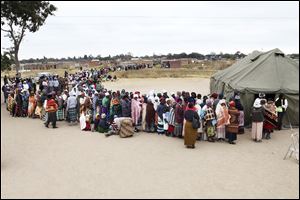
Editorials
Bad business as usual
8/24/2013
Mugabe
Zimbabwe is in more or less the same place it was after its 2008 election. President Robert Mugabe claims he has won, and the leader of the opposition that probably won says the African nation’s recent election was “a huge farce.”
Mr. Mugabe, 89 years old and frail, has presided over Zimbabwe, the former white-minority-ruled Rhodesia, since 1980. In the recent election for the presidency and parliament, Mr. Mugabe ran for another five-year term.
Zimbabwe is enjoying slight improvement in the state of its economy, based in part on the replacement of its hyper-inflated currency in 2009 by the U.S. dollar. But in general, Mr. Mugabe has reduced a healthy economy based on agriculture, mining, and light industry to a state of extreme poverty for much of the population. Unemployment among Zimbabwe’s 13 million people is estimated at 85 percent.
Zimbabwe’s last election, in 2008, resulted in victory for the party of his principal opponent, Morgan Tsvangirai. But Mr. Mugabe’s party claimed it won. Mr. Mugabe’s security forces and other thugs killed hundreds of supporters of the opposition.
Zimbabwe’s neighbors eventually intervened to put together an uneasy coalition government that included both Mr. Mugabe and Mr. Tsvangirai. The coalition has ruled for five years, rather unsuccessfully.
This time, based on Mr. Mugabe’s age and health, and the pathetic state of the economy, the opposition was expected to win. Mr. Mugabe stated that if he lost he would step down, but it was expected that he would not accept defeat.
Many Zimbabweans voted in the election, but the voter rolls were badly flawed and an estimated 1 million voters were unable to take part. No Western organizations were allowed to send observers. Representatives of the African Union and Southern Africa Development Community described the elections as reasonably well conducted.
Nonetheless, Zimbabwe now seems to be in the same dilemma as it was after the previous election. It will be up to someone — not the United States, probably southern African states and the African Union — to sort out the mess. Meanwhile, ordinary Zimbabweans will suffer.